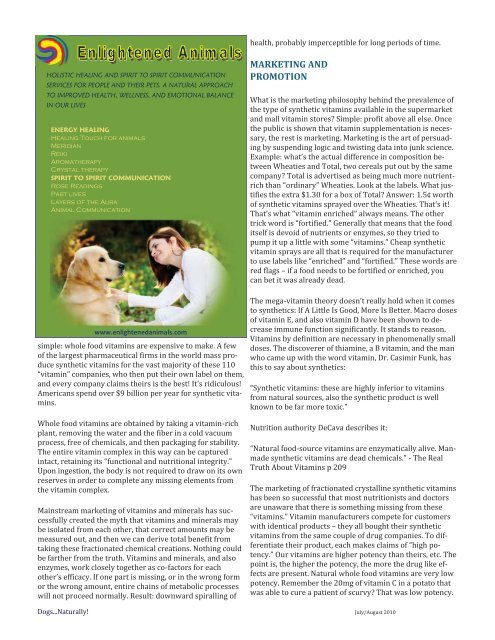July/August 2010 - Dogs Naturally Magazine
July/August 2010 - Dogs Naturally Magazine
July/August 2010 - Dogs Naturally Magazine
You also want an ePaper? Increase the reach of your titles
YUMPU automatically turns print PDFs into web optimized ePapers that Google loves.
HOLISTIC HEALING AND SPIRIT TO SPIRIT COMMUNICATION<br />
SERVICES FOR PEOPLE AND THEIR PETS. A NATURAL APPROACH<br />
TO IMPROVED HEALTH, WELLNESS, AND EMOTIONAL BALANCE<br />
IN OUR LIVES<br />
ENERGY HEALING<br />
Healing Touch for animals<br />
Meridian<br />
Reiki<br />
Aromatherapy<br />
Crystal therapy<br />
SPIRIT TO SPIRIT COMMUNICATION<br />
Rose Readings<br />
Past lives<br />
Layers of the Aura<br />
Animal Communication<br />
www.enlightenedanimals.com<br />
simple: whole food vitamins are expensive to make. A few<br />
of the largest pharmaceutical firms in the world mass produce<br />
synthetic vitamins for the vast majority of these 110<br />
“vitamin” companies, who then put their own label on them,<br />
and every company claims theirs is the best! It’s ridiculous!<br />
Americans spend over $9 billion per year for synthetic vitamins.<br />
Whole food vitamins are obtained by taking a vitamin-rich<br />
plant, removing the water and the fiber in a cold vacuum<br />
process, free of chemicals, and then packaging for stability.<br />
The entire vitamin complex in this way can be captured<br />
intact, retaining its “functional and nutritional integrity.”<br />
Upon ingestion, the body is not required to draw on its own<br />
reserves in order to complete any missing elements from<br />
the vitamin complex.<br />
Mainstream marketing of vitamins and minerals has successfully<br />
created the myth that vitamins and minerals may<br />
be isolated from each other, that correct amounts may be<br />
measured out, and then we can derive total benefit from<br />
taking these fractionated chemical creations. Nothing could<br />
be farther from the truth. Vitamins and minerals, and also<br />
enzymes, work closely together as co-factors for each<br />
other’s efficacy. If one part is missing, or in the wrong form<br />
or the wrong amount, entire chains of metabolic processes<br />
will not proceed normally. Result: downward spiralling of<br />
health, probably imperceptible for long periods of time.<br />
MARKETING AND<br />
PROMOTION<br />
What is the marketing philosophy behind the prevalence of<br />
the type of synthetic vitamins available in the supermarket<br />
and mall vitamin stores? Simple: profit above all else. Once<br />
the public is shown that vitamin supplementation is necessary,<br />
the rest is marketing. Marketing is the art of persuading<br />
by suspending logic and twisting data into junk science.<br />
Example: what’s the actual difference in composition between<br />
Wheaties and Total, two cereals put out by the same<br />
company? Total is advertised as being much more nutrientrich<br />
than “ordinary” Wheaties. Look at the labels. What justifies<br />
the extra $1.30 for a box of Total? Answer: 1.5¢ worth<br />
of synthetic vitamins sprayed over the Wheaties. That’s it!<br />
That’s what “vitamin enriched” always means. The other<br />
trick word is “fortified.” Generally that means that the food<br />
itself is devoid of nutrients or enzymes, so they tried to<br />
pump it up a little with some “vitamins.” Cheap synthetic<br />
vitamin sprays are all that is required for the manufacturer<br />
to use labels like “enriched” and “fortified.” These words are<br />
red flags – if a food needs to be fortified or enriched, you<br />
can bet it was already dead.<br />
The mega-vitamin theory doesn’t really hold when it comes<br />
to synthetics: If A Little Is Good, More Is Better. Macro doses<br />
of vitamin E, and also vitamin D have been shown to decrease<br />
immune function significantly. It stands to reason.<br />
Vitamins by definition are necessary in phenomenally small<br />
doses. The discoverer of thiamine, a B vitamin, and the man<br />
who came up with the word vitamin, Dr. Casimir Funk, has<br />
this to say about synthetics:<br />
“Synthetic vitamins: these are highly inferior to vitamins<br />
from natural sources, also the synthetic product is well<br />
known to be far more toxic.”<br />
Nutrition authority DeCava describes it:<br />
“Natural food-source vitamins are enzymatically alive. Manmade<br />
synthetic vitamins are dead chemicals.” - The Real<br />
Truth About Vitamins p 209<br />
The marketing of fractionated crystalline synthetic vitamins<br />
has been so successful that most nutritionists and doctors<br />
are unaware that there is something missing from these<br />
“vitamins.” Vitamin manufacturers compete for customers<br />
with identical products – they all bought their synthetic<br />
vitamins from the same couple of drug companies. To differentiate<br />
their product, each makes claims of “high potency.”<br />
Our vitamins are higher potency than theirs, etc. The<br />
point is, the higher the potency, the more the drug like effects<br />
are present. Natural whole food vitamins are very low<br />
potency. Remember the 20mg of vitamin C in a potato that<br />
was able to cure a patient of scurvy? That was low potency.<br />
<strong>Dogs</strong>...<strong>Naturally</strong>! <strong>July</strong>/<strong>August</strong> <strong>2010</strong>












